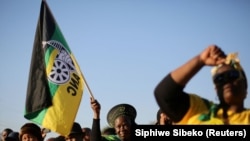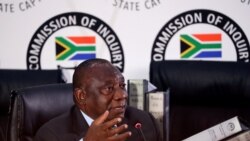Africa’s oldest former liberation movement, South Africa’s African National Congress, appears to be in crisis ahead of local government elections next month.
The ruling party had put faith in the Electoral Commission's application to postpone the polls to elect political leaders in towns and cities until next year due to the COVID-19 pandemic. But the bid was recently rejected by South Africa's top court, according to court documents.
Political analysts say the governing party is now in serious danger of losing cities to opposition parties. Local elections are scheduled to take place between October 27 and November 1.
The ANC's image has taken hits in the court of public opinion, where it's judged to still be allowing high-level corruption to flourish — a problem President Cyril Ramaphosa has previously acknowledged.
South Africans also remain angered by the government's response to mass demonstrations which erupted in several cities in July following the arrest of former President Jacob Zuma as part of a corruption probe.
Ralph Mathekga, a political analyst and author of several books about the party, has predicted that the ANC will lose power before the end of the decade.
“You have problems that have compounded to a point where you have now multiple inquiries demonstrating the weakness within the ANC," he said. "You have a party that is not well-aligned to deal with the scourge of corruption.”
Many of those in the ANC tasked with fighting graft are themselves implicated in financial crimes, Mathekga said. With seven weeks to go before the election, the ANC doesn’t know who its candidates are in many municipalities.
Ivor Sarakinsky, a professor of governance at Wits University, said this “chaos” shows how much the party has “decayed” since it became South Africa’s first democratically elected government in 1994.
“You end up in a situation where large numbers of ANC votes aren’t in the system," he said. "That means that in those municipalities, the ANC could be significantly weakened as a result of low voter turnout. The ANC should be really, really worried about this.”
Mathekga said the party has always relied on “money from secret sources”, but new legislation is hampering its efforts to fund campaigns.
“The ANC’s also going into a very unfamiliar electoral environment whereby we now have transparency regarding party finance," he said. "That means anyone who wants to finance the party now knows their name will be known, according to the new laws. All these things are making it very difficult for the party to hang on. The ANC’s barely hanging in the key metros in this country.”
The party’s branches are also rife with infighting as members battle to be on ANC lists that could give them access to lucrative jobs.
Sarakinsky said the ANC has “made a habit” of appointing city officials based not on their skills and competence, but on their influence in the party.
The ANC lost lost majority power to the opposition Democratic Alliance party in Cape Town. If the party loses other big cities, such as Johannesburg and Pretoria, Mathekga said it will set off a “snowball effect” and the ANC will lose municipalities across South Africa.
Mathekga said the ANC is doomed to become a party that remains popular in a few provinces and cities, but no longer is strong enough to govern the whole country.
“They’ve been losing three percent election on election," he said. "Now the branches are divided because leaders are tearing each other apart. The party cannot even offer a coherent campaign platform."








